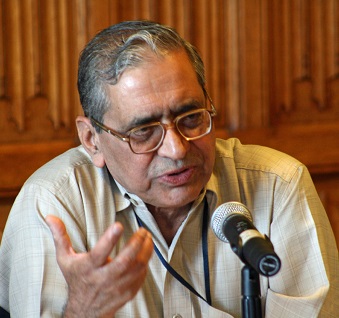
In his own estimate, Prof. Kapil Kapoor has been teaching for over sixty years. He is something of a legend not only among his numerous students, but also among students of Indian Knowledge Systems, of which he has been one of the pioneers in India. Generations of them have been fascinated by his lucid, invigorating and ever original expositions, as a speaker and a writer alike, of the most abstruse concepts of Indian literature, philosophy, aesthetics, languages and textual studies. Above all, he has been an unmatched champion of India’s intellectual traditions.
Prof. Kapil Kapoor has a long list of accomplishments: he taught at Jawaharlal Nehru University, New Delhi, for many years, as Professor of English (in the Centre for Linguistics and English) and as Concurrent Professor at JNU’s Special Centre for Sanskrit Studies (now School of Sanskrit and Indic Studies). He was also Dean of the School of Language, Literature and Culture Studies (1996-1999) and JNU’s Rector (Pro-Vice-Chancellor, 1999-2002). He was a member of numerous bodies, among them the Indian Council of Philosophical Research, the Central University of Higher Tibetan Studies, Sarnath, and the Sanchi University of Buddhist and Indic Studies, Madhya Pradesh. He chaired the important MHRD Language Expert Committee for Comprehensive Language Policy for India, whose report is under consideration, and was Chairman of the Indian Institute of Advanced Study, Shimla. He steered the pioneering CBSE elective course for classes XI and XII, “Knowledge Traditions and Practices of India” (KTPI) and co-edited its two-volume textbook (with Michel Danino).
Prof. Kapil Kapoor has a considerable body of works to his credit, including Language, Literature and Linguistics: The Indian Perspective (1994), South Asian Love Poetry (1994), Canonical Texts of Literary Criticism (1995), Literary Theory: Indian Conceptual Framework (1998), Text and Interpretation: The Indian Tradition (2005), Dimensions of Panini Grammar: Indian Grammatical System (2005), Rati-Bhakti in India’s Narrative Traditions (in Hindi, 2011), Comparative Literary Theory: An Overview (2014) and Abhinavagupta Manuscripts (forthcoming). He also edited Indian Knowledge Systems (2 vols, 2002), an 11-Volume Encyclopaedia of Hinduism (2012), and an Encyclopaedia of Indian Poetics (under publication).
Abstracts of the Lectures
The landscape of Indian literatures
Indian literatures, written and oral, classical and modern, have a long history, extensive linguistic diversity, and immense variety of forms; most are a product of the essentially oral Indian culture. Whether pan-Indian or regional, there is an Indianness about them in themes, values and forms. There are also widespread compositions in almost all Indian languages of verse narratives devoted to love and war that are aural-visual compositions and are meant to be performed. This large body of literature is essentially participative and operates in many ways in the social, cultural life of the Indian people, including the unlettered, making it celebratory in its function. This talk will explore some of the main motifs, objectives and forms of Indian literatures.
Shah Hussain, 16th-century Punjabi Sufi poet
The son of a weaver, Shah Hussain was born in Lahore and is considered a pioneer of the kāfī form of Punjabi poetry. Many of his kāfīs have been set to music and form an integral part of Punjabi folk culture. His poetry is distinguished by excellence of lexical choice and depth of feeling. He is also considered a mystic poet because even when he is talking of his lover or beloved, his utterances border on divinity. Unusually for his age, he was a voice of women. Through his poetry, Shah Hussain created new values in the society and challenged the older ones.